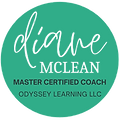Coaching Kids...The Rewards of Empowering the Youngest Minds!
- Diane McLean, MEd, PCC
- Mar 16, 2018
- 2 min read
I love my job. I am a life coach and I specialize in working with clients with ADHD and executive function challenges. It is thoroughly rewarding to work with adults and adolescents (yes, teens!) - watching them walk away with some clarity and direction and forward progress toward calming the chaos that is the ADHD brain. However, there is something I love even more about my work: little kids. And I mean little. Squirmy kindergartners. Sassy 7-year-olds. And even frustrated, overwhelmed, anxious third-graders who have no earthly idea why they are always in trouble at home and at school, even when they try with all their might to do what is expected.
Some days I feel a little alone in my field. Many people believe coaching is not effective for kids, the little ones anyway. I don't believe it for one second. What I do believe is that many coaches are not comfortable working with young children...how to talk and listen to them through their own language of play, how to help them set goals, learn about their strengths, take steps toward greater self-regulation.
In my opinion, young children are the most under-served population in the ADHD coaching world. And what a shame, since ADHD for many years was seen as a childhood disorder. However, more and more coaches are being trained every day to help fill this void through accredited coach training organizations like the ADD Coach Academy. We must continue to give great coaches tools to help these young people.
I am all about also helping adults who work with kids: parents, coaches teachers, therapists, and other professionals in the field of ADHD. I work with a lot of schools to give teachers tools to help students with (or without) ADHD who struggle with self-regulation, attention, time awareness, task initiation and completion, planning, and organization.
With all the ruckus about the use of fidgets in the classroom, that topic came up at a recent presentation I was giving at an elementary school. Some teachers and schools have banned the use of fidgets, in spite of the benefits of their appropriate use. It was one of my youngest clients, a six-year-old girl, whose wisdom I passed on to the teachers."Fidgets are brain tools. They are not toys."
It is out of the mouths of babes I learn more and more about the potential young children have to make significant changes in their lives...changes that can help them prevent some of the stress and heartache faced by many adolescents and adults with ADHD. I believe in kids...and hopefully it is an investment that will pay off for them for years to come.
For more information about how you can help young children with ADHD, contact Diane McLean or click here to check out her website.
_edited.png)








Comments